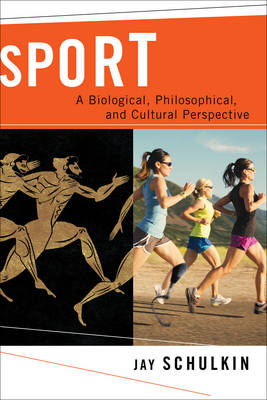
Sport
A Biological, Philosophical, and Cultural Perspective
Seiten
2016
Columbia University Press (Verlag)
978-0-231-17676-7 (ISBN)
Columbia University Press (Verlag)
978-0-231-17676-7 (ISBN)
- Titel z.Zt. nicht lieferbar
- Versandkostenfrei innerhalb Deutschlands
- Auch auf Rechnung
- Verfügbarkeit in der Filiale vor Ort prüfen
- Artikel merken
The neuroscientist Jay Schulkin argues that biology and culture do more than coexist when we play sports—they blend together seamlessly, propelling each other toward greater physical and intellectual achievement.
Sports are as varied as the people who play them. We run, jump, and swim. We kick, hit, and shoot balls. We ride sleds in the snow and surf in the sea. From the Olympians of ancient Greece to today's professional athletes, from adult pickup soccer games to children's gymnastics classes, people at all levels of ability at all times and in all places have engaged in sport. What drives this phenomenon? In Sport, the neuroscientist Jay Schulkin argues that biology and culture do more than coexist when we play sports-they blend together seamlessly, propelling each other toward greater physical and intellectual achievement. To support this claim, Schulkin discusses history, literature, and art-and engages philosophical inquiry and recent behavioral research. He connects sport's basic neural requirements, including spatial and temporal awareness, inference, memory, agency, direction, competitive spirit, and endurance, to the demands of other human activities. He affirms sport's natural role as a creative evolutionary catalyst, turning the external play of sports inward and bringing insight to the diversion that defines our species. Sport, we learn, is a fundamental part of human life.
Sports are as varied as the people who play them. We run, jump, and swim. We kick, hit, and shoot balls. We ride sleds in the snow and surf in the sea. From the Olympians of ancient Greece to today's professional athletes, from adult pickup soccer games to children's gymnastics classes, people at all levels of ability at all times and in all places have engaged in sport. What drives this phenomenon? In Sport, the neuroscientist Jay Schulkin argues that biology and culture do more than coexist when we play sports-they blend together seamlessly, propelling each other toward greater physical and intellectual achievement. To support this claim, Schulkin discusses history, literature, and art-and engages philosophical inquiry and recent behavioral research. He connects sport's basic neural requirements, including spatial and temporal awareness, inference, memory, agency, direction, competitive spirit, and endurance, to the demands of other human activities. He affirms sport's natural role as a creative evolutionary catalyst, turning the external play of sports inward and bringing insight to the diversion that defines our species. Sport, we learn, is a fundamental part of human life.
Jay Schulkin is a research professor in the Department of Neuroscience at Georgetown University. He is the author of numerous books, including Reflections on the Musical Mind: An Evolutionary Perspective (2013).
Introduction 1. The Concept of Sport 2. Sports, Brain, Body, and the World 3. Evolution, Play, and Sport 4. Genetics, Epigenetics, and Talent 5. Regulation, Recovery, and Resilience 6. Running and the Brain: Neurogenesis 7. Throwing, Swimming, and Rowing 8. Fairness and Sports 9. Dignity and Beauty Conclusion References Index
| Erscheinungsdatum | 04.10.2016 |
|---|---|
| Zusatzinfo | 65 b&w illustrations |
| Verlagsort | New York |
| Sprache | englisch |
| Maße | 152 x 229 mm |
| Themenwelt | Sachbuch/Ratgeber ► Sport |
| Geisteswissenschaften ► Philosophie ► Ethik | |
| Naturwissenschaften ► Biologie ► Evolution | |
| Naturwissenschaften ► Biologie ► Humanbiologie | |
| Naturwissenschaften ► Biologie ► Zoologie | |
| Sozialwissenschaften ► Soziologie ► Mikrosoziologie | |
| ISBN-10 | 0-231-17676-7 / 0231176767 |
| ISBN-13 | 978-0-231-17676-7 / 9780231176767 |
| Zustand | Neuware |
| Haben Sie eine Frage zum Produkt? |
Mehr entdecken
aus dem Bereich
aus dem Bereich


